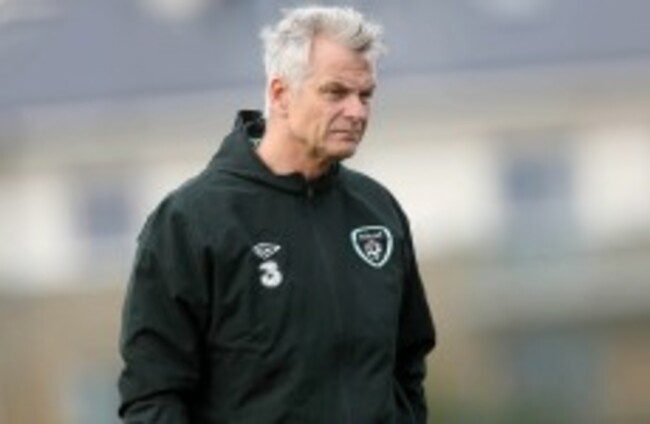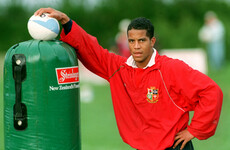ON LAST SATURDAY’S RTÉ panel, Richie Sadlier raised the biggest issue facing our Senior International side; the lack of talent coming through. This worry is compounded by the lack of Irish players playing in the upper half of the ‘big leagues’.
There are a number of causes but fundamentally we haven’t had a coherent plan to develop talent at home. We had 32 independent schoolboy leagues, all doing their own thing, rebelling against change. We rode our luck for years, it ran out.
We have relied on the unpopular, though effective, DDSL hoovering up the nation’s talented schoolboys, before moving them to UK ‘finishing schools’. At times, the DDSL seemed little more than a meat market for scouts where all the best kids could be seen at once; the Kennedy Cup competition the same. After a few years in DDSL, we sold the kids on and relied on UK clubs to produce an international-standard player. We struggled until they were 16, then we washed our hands.
These days, the amount of money in the UK means their clubs have worldwide scouting networks. Everton’s is supported by a technology company in Limerick. Their systems enable Everton’s global scouting network to provide real time, on-going analysis and updates on players everywhere in the world. While Irish, and some international, scouts still scour Kennedy Cup and DDSL games, they’re a small and increasingly marginalised part of the UK scouting network.
We do not register as a source of high-quality young players. Brendan Rodgers touched on this last year before the Liverpool versus Shamrock Rovers friendly in the Aviva. When Irish kids enter a UK academy, they’re already behind kids from the UK and Europe. While Irish kids still travel to UK academies each year, no-one admits the startling numbers that return home heartbroken after failing to earn professional contracts.
We are miles behind the top academies. While at Limerick FC, I was lucky enough to spend some time working with and learning about Ghana’s ‘Right to dream’ academy, run by the former head of Youth Development at Manchester United. They’ve been ranked as the 15th best academy in the world. Their kids are schooled full-time from 12 years old, but it’s not a hot house, it’s a boarding school. Education is as important as football; graduates have chosen scholarships and further education over European football. Others have gone on to play professionally worldwide.
That said, they train and have football-specific classes four hours per day, six days a week. When they travel for international competitions, they win. I saw their u18s annihilate Everton’s Premier League Development squad in 2013.
In this environment, the weekly 90 minutes top-up training our ‘emerging talent Elite’ kids get can’t compete. Nor can the wildly varying direction and levels of training they get from their clubs. The UK is only going to bring a tiny percentage of Irish kids into academies and those players now face unprecedented international competition. The FAI have started to look at what we can control.
Ruud Dokter’s plans don’t meet with everyone’s approval, but at least it’s a coherent plan designed to produce players of higher quality. Switching to a summer league? Get kids to focus on football exclusively from 12? So be it; if we qualify for World Cups and European Championships, we’re not going to worry whether our players would have been handy hurlers or scrum halves. Up to recent years, we’ve been winging it, hoping that the UK will do our development. No longer, the UK are worried about themselves, they’re struggling to bring their own kids through.
Profile, standards and money dictate that the very best Irish kids will still go to larger clubs in the UK, but that’s true of every country with a weaker domestic league than the EPL. What we have to ensure is that the u17, u19 and Senior Leagues here are supported and developed to a level that they can form a genuine part of the pathway to senior international sides. Even if we acknowledge a player won’t be called up while playing League of Ireland, we can still produce better players.
It will cost money, but most of Irish football’s income is due to the Senior International side, and related to success. Money put towards improved coaching and facilities for young players is investment, not waste. Regional Development Officers across the country being cut is waste. If you’re going to take any financial risk in Irish football, it has to be in creating an environment that can continually produce good players.
An Irish eight-year-old has as much potential as an eight-year-old anywhere else in the world, but it’s the responsibility of the FAI, the SFAI, the LoI and the football family to ensure that we put structures, support and coaches in places that harness that potential. If we don’t, we’ll continue to reach tournaments rarely, and by accident, when every other country is doing it by design.












Great article Murray! Nice to see rugby involved in such activity.
Well done to the manager and team for doing this,a day that young chap will remember forever,hope he got some good seats for the upcoming games ;-)